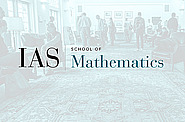Seminars Sorted by Series
Joint PU/IAS Number Theory
Mar
07
2024
Joint PU/IAS Number Theory
Squarefree Numbers in Short Intervals
Mayank R. Pandey
4:30pm|Simonyi 101 and Remote Access
Mar
14
2024
Joint PU/IAS Number Theory
Moments of Quadratic L-Functions Over Function Fields
Adrian Diaconu
4:30pm|*Princeton University, Fine 214*
Mar
21
2024
Joint PU/IAS Number Theory
Vanishing of Selmer Groups for Siegel Modular Forms
Sam Mundy
4:30pm|Simonyi 101 and Remote Access
Mar
28
2024
Joint PU/IAS Number Theory
Kashiwara Crystals in Endoscopy
Griffin Wang
4:30pm|*Princeton University, Fine 214*
Apr
04
2024
Joint PU/IAS Number Theory
The Not-So-Local-Global Conjecture
James Rickards
4:30pm|Simonyi 101 and Remote Access
Apr
11
2024
Joint PU/IAS Number Theory
Ax-Schanuel and Exceptional Integrability
Jonathan Pila
3:00pm|*Princeton University, Fine 214*
Apr
11
2024
Joint PU/IAS Number Theory
Infinite Orbits In Certain Elliptic Surfaces, Ax Schanuel, and Ramification In The Legendre Family
Umberto Zannier
4:30pm|*Princeton University, Fine 214*
Apr
18
2024
Joint PU/IAS Number Theory
Zeta and Multizeta for Function Fields
Dinesh Thakur
4:30pm|Simonyi 101 and Remote Access
Apr
25
2024
Joint PU/IAS Number Theory
Higher Congruences For Modular Forms and Zeta Elements
Eric Urban
4:30pm|*Princeton University, Fine 214*
May
02
2024
Joint PU/IAS Number Theory
Relative Langlands and Endoscopy
Spencer Leslie
4:30pm|*Princeton University, Fine 214*
May
09
2024
Joint PU/IAS Number Theory
Derived Hecke Action For Weight One Modular Forms Via Classicality
Gyujin Oh
3:30pm|Simonyi 101 and Remote Access
Oct
03
2024
Joint PU/IAS Number Theory
Generic Positivity of the Beilinson-Bloch Height of Gross-Schoen and Ceresa Cycles
Ziyang Gao
3:30pm|Princeton University, 134 Lewis Science Library
Oct
10
2024
Joint PU/IAS Number Theory
Second Moment of the GL_3 Standard L-function on the Critical Line
Matthew Young
3:30pm|Simonyi 101 and Remote Access
Oct
17
2024
Joint PU/IAS Number Theory
First Explicit Reciprocity Law for Unitary Friedberg—Jacquet Periods
Murilo Zanarella
3:30pm|Simonyi 101 and Remote Access
Oct
24
2024
Joint PU/IAS Number Theory
$p$-Adic $L$-Functions for $P$-Ordinary Hida Families On Unitary Groups
David Marcil
3:30pm|314 Fine Hall
Oct
31
2024
Joint PU/IAS Number Theory
Bass Note Spectra of Binary Forms
Giorgos Kotsovolis
3:30pm|Simonyi 101 and Remote Access
Nov
07
2024
Joint PU/IAS Number Theory
The Cohen-Lenstra Moments Over Function Fields
Aaron Landesman
3:30pm|314 Fine Hall
Nov
14
2024
Joint PU/IAS Number Theory
Local-Global Principles and Effective Rates of Equidistribution For Semisimple Orbits
Andreas Wieser
3:30pm|Simonyi 101 and Remote Access
Nov
21
2024
Joint PU/IAS Number Theory
Quadratic Characters With Non-Negative Partial Sums
Kannan Soundararajan
3:30pm|314 Fine Hall
Dec
05
2024
Joint PU/IAS Number Theory
The Orbit Method and Analysis in Representation Theory
Trajan Hammonds
3:30pm|314 Fine Hall
Dec
12
2024
Joint PU/IAS Number Theory
Inductive Methods for Counting Number Fields
Brandon Alberts
3:30pm|Simonyi 101 and Remote Access
Feb
06
2025
Feb
13
2025
Joint PU/IAS Number Theory
Automatic Convergence of Modular Forms
Aaron Pollack
3:30pm|*Princeton University, Fine 214*
Feb
20
2025
Joint PU/IAS Number Theory
Hilbert's 10th Problem Over Rings of Integers
Ari Shnidman
3:30pm|Simonyi 101 and Remote Access
Feb
27
2025
Joint PU/IAS Number Theory
Algebraicity of Spin L-functions for GSp_6
3:30pm|Simonyi 101 and Remote Access
Mar
06
2025
Joint PU/IAS Number Theory
Multiple Dirichlet Series, Moments of L-functions, and Symmetry
Ian Whitehead
3:30pm|*Princeton University, Fine 214*
Mar
13
2025
Joint PU/IAS Number Theory
Polyhedra, Hyperbolic 3-Manifolds, and Arithmetic
3:30pm|Simonyi 101 and Remote Access
Mar
20
2025
Joint PU/IAS Number Theory
Sparsity of Intersections With Group Subschemes in an Abelian Scheme
Tangli Ge
3:30pm|*Princeton University, Fine 214*
Mar
27
2025
Joint PU/IAS Number Theory
Algebraic Integers of Bounded Height and Given Galois Group
Andy O’Desky
3:30pm|Simonyi 101 and Remote Access
Apr
03
2025
Joint PU/IAS Number Theory
Tamely Ramified Pro-P Extensions of Number Fields
Ravi Ramakrishna
3:30pm|*Princeton University, Fine 214*
Apr
10
2025
Joint PU/IAS Number Theory
There Are Infinitely Many Elliptic Curves Over the Rationals of Rank 2
David Zywina
3:30pm|Simonyi 101 and Remote Access
Apr
17
2025
Joint PU/IAS Number Theory
Recent Progress on Gauss Sums and Primes
Alex Dunn
3:30pm|*Princeton University, Fine 214*
Apr
24
2025
Joint PU/IAS Number Theory
Faltings Heights and the Sub-Leading Terms of Adjoint L-Functions
Wei Zhang
3:30pm|*Princeton University, Fine 214*
May
01
2025
Joint PU/IAS Number Theory
On the Geometry and Arithmetic of Non-Spherical Maass Forms
3:30pm|Simonyi 101 and Remote Access
May
08
2025
Joint PU/IAS Number Theory
Arithmetic Applications of Random Multiplicative Functions
Max Wenqiang Xu
4:30pm|Simonyi 101 and Remote Access
May
15
2025
Joint PU/IAS Number Theory
On the Arithmetic of Genus 4 Curves
Jiahui Gao
3:30pm|Simonyi 101 and Remote Access
Sep
18
2025
Joint PU/IAS Number Theory
A P-Adic Extension Theorem for Shimura Varieties and Period Images
3:30pm|Fine 110, Princeton University
Sep
25
2025
Joint PU/IAS Number Theory
Near-Center Derivatives and Arithmetic 1-Cycles
Ryan Chen
3:30pm|Fine 110, Princeton University
Oct
02
2025
Joint PU/IAS Number Theory
The Intersection of Modular Correspondence
Baiqing Zhu
3:30pm|Fine 110, Princeton University
Oct
30
2025
Joint PU/IAS Number Theory
The Intersection of Modular Correspondences Continued and a General Conjecture
Qiao He
3:30pm|Fine 110, Princeton University
Nov
13
2025
Joint PU/IAS Number Theory
Spectral Properties of Arithmetic Manifolds
Alex Bartel
3:30pm|Fine 110, Princeton University
K-Theory of Group C* Algebras (An Introduction to K-Theory and the Baum-Connes Conjecture)
Nov
30
2004
K-Theory of Group C* Algebras (An Introduction to K-Theory and the Baum-Connes Conjecture)
Some Classical Problems and Conjectures
2:00pm|S-101
Dec
02
2004
K-Theory of Group C* Algebras (An Introduction to K-Theory and the Baum-Connes Conjecture)
What is K-Theory and What is it Good For?
2:00pm|S-101
Dec
07
2004
K-Theory of Group C* Algebras (An Introduction to K-Theory and the Baum-Connes Conjecture)
Dirac Operator
2:00pm|S-101
Dec
09
2004
K-Theory of Group C* Algebras (An Introduction to K-Theory and the Baum-Connes Conjecture)
Universal Example for Proper Actions
2:00pm|S-101
Lecture in History of Mathematics
Mar
01
2023
Lecture in History of Mathematics
What Have We Learned From the Archimedes Palimpsest?
William Noel and Reviel Netz
11:15am|Rubenstein Commons | Meeting Room 5
Lecture Series on Some Aspects of the p-adic Local Langlands Correspondence for GL(2,Q_P)
Oct
14
2010
Oct
21
2010
Oct
28
2010
Nov
04
2010

